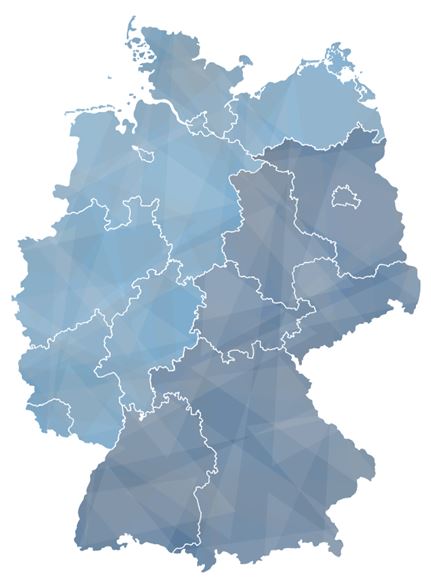
Source: Fotolia / 3dkombinat
Digitalization opens up new opportunities for people and businesses in Germany and is constantly changing everyday life and the economy. Providing universal coverage with high-performance gigabit networks available to all citizens, businesses and public institutions is the basis for a successful implementation of digital opportunities in all fields of industry and society in urban and rural areas.
For industry, gigabit networks are an important locational factor in global competition. They are, among other things, essential for new forms of production, intelligent mobility, the use of artificial intelligence, digital education and distributed work. The existing services such as video streaming, working from home, home schooling or the use of games consoles, especially in parallel, and not least mobile communications are already utilizing the available networks to capacity. This development will gain even more momentum. The network infrastructure must be capable of meeting the increasing requirements at any time.
The grey spots funding programme
The key digital policy objective of the Federal Government is thus to create gigabit capable internet connections for all households and businesses in Germany. In areas where roll-out is not economically efficient and a failure of the market is observed, the Federal Government provides support with a relaunch of the broadband funding programme, also known as the grey spots funding programme.
In total, the Federal Government is making available approx. 12 billion euros for promoting fibre-optic links. These funds are used to cover 50 to 70 percent of the costs of the gigabit roll-out (value for money gap or operator model) as well as 100 percent of the costs of external consultancy and planning services. The federal states are also assuming a share of the costs incurred for the gigabit roll-out so that the funding of the projects is secured.
The current 30 Mbit/s threshold has been increased to 100 Mbit/s.
All connections with a download bandwidth of consistently less than 100 Mbit/s (aka grey spots) are eligible for funding.
The socio-economic focal points of a funding area, which besides schools, hospitals and business parks include transport hubs, authorities as well as small and medium-sized undertakings, are eligible for funding independent of the threshold, given they are not yet gigabit ready. Moreover, individual connections of schools, hospitals and companies in business parks with a download bandwidth of consistently less than 500 Mbit/s are always eligible for funding throughout Germany The locally available data rate is contained in the Broadband Atlas (German only).
Applications could be submitted as of 26 April 2021.
Applications for funding of gigabit roll-out within the grey spots funding programme could be submitted by municipalities, rural districts, associations of local authorities, other regional or local authorities as well as companies in exclusively public ownership.
The funding programme is carried out by two project developers who are each responsible for about half of the eligible cases. The project development is assumed by atene KOM GmbH and PwC GmbH.
Project developer
atene KOM
Point of contact for:
Bremen, Hamburg, Hesse, Mecklenburg-Western Pomerania, Lower Saxony, North Rhine-Westphalia, Rhineland-Palatinate, Saarland, Schleswig-Holstein
Phone: +49 30 233249777
Email: projekttraeger@atenekom.eu

Source: BMDV
Project developer
PwC
Point of contact for:
Baden-Württemberg, Bavaria, Berlin, Brandenburg, Saxony, Saxony-Anhalt, Thuringia
Phone: +49 30 26365050
Email:
kontakt@gigabit-pt.de
7 steps towards the gigabit network:
| Steps | Explanation |
|---|---|
| Applications | The regional or local authorities register with the relevant online platforms (see above) and can then define the funding areas with the help of the GIS module. They are supported by intuitive application forms and a regional advisor of the respective project developer. The online platform provides maps with further information for the applicants. Applications for consultancy services and broadband roll-out projects can be submitted. |
| Conduct of a market survey | The market surveys can be initialized via the online platforms. Further information is provided via the relevant online portal depending on the project development area. This includes for example maps of the project area or address lists as well as coverage information. The relevant portals of the project developers also provide wordings for all queries regarding the market survey. The reports of the telecommunications companies on existing infrastructure and their intentions to deploy their own networks can also be processed via the relevant portals of the project developers. The reporting period is at least eight weeks. This step has to be taken before initiating the tender process. |
| Funding pledge (notification of provisional level of funding) | The regional or local authority receives the notification of provisional level of funding as a funding pledge. With this notification, the construction go-ahead is also granted. The construction measures can, in general, start after the completion of the tender process. The actual start of construction has to be notified no later than two weeks prior to the date of the ground-breaking ceremony. |
| Tender process | The tender process has to be published no later than 12 months after the end of the market survey. The regional or local authority is provided with a guide, a model for executing the process and a model contract. |
| Issue of notification of final level of funding | After receiving the tender documents, the grant-awarding agency records the final level of funding in a notification in keeping with the market price calculated in the tender process. |
| Construction phase and disbursement | The funds are generally disbursed depending on the progress of the construction work. The grant-awarding agency carries out random construction supervision measures. Planning costs can be billed as a lump sum in connection with a construction start date scheduled within six months. |
| Final expenditure report and final invoice | The local authority receives the information on the final expenditure report from the company delivering the roll-out. It forwards this information to the grant-awarding agency. The final instalment is disbursed after a successful review by the grant-awarding agency. |
The KfW funding offer for broadband roll-out
These measures are eligible for funding by KfW:
- Construction and roll-out of passive FTTH/FTTB networks, including backbone roll-out and link-up with other infrastructures (e.g. mobile communications masts or data centres)
- Active components of a FTTH/FTTB network, including in-house cabling
- Planning and ancillary costs
Funding options provided by KfW:
‘KfW-Investitionskredit Digitale Infrastruktur’
- Loan with favourable, federally reduced interest rates for private and local authority companies
- As a standard loan: up to 50 million euros, as an individual loan with more flexible funding structures: from 15 million euros
- Loan period of up to 30 years and fixed-interest period of up to 20 years
Further information can be found here (German only).
‘KfW-Konsortialkredit Digitale Infrastruktur’
- Funding in a consortium for private and local authority companies as well as project companies
- Flexible funding structures and individual conditions
- Easier access to the loan due to a KfW risk share of up to 30 million euros
- Optional refinancing of the partners in the consortium
Further information can be found here (German only).